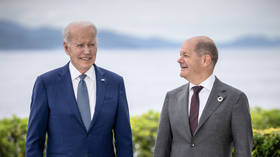Germany is all too happy to paint a target on its back
Has Olaf Scholz gone too far with his subservience to Washington by agreeing to host American missiles?

For a government, it's one thing to have bad ideas of its own, but far worse to implement another governments’ bad ideas – and tolerate no debate about them at home.
And yet that's what is happening now in Germany. Or, at least, it is what the unpopular coalition government under Chancellor Olaf Scholz and its proxies in the mainstream media are trying to achieve with regard to the planned stationing of intermediate-range missiles.
Appropriately enough – considering that post-Nord Stream attacks, obediently self-deindustrializing Berlin has become an embarrassingly submissive American vassal – it was from Washington, as a sideshow to the recent NATO extravaganza, that Germans were first told they will host a whole new class of American weapons soon. From 2026, these so-called “long range fire capabilities” are scheduled to initially consist of Tomahawk and SM-6 missiles, and later include new hypersonic systems.
The placement is supposed to be temporary at first and then become permanent. Once set up in Germany, these weapons, with ranges of up to 2,500 kilometers, could threaten the core of Russia, including Moscow, with attacks that would take only about ten minutes from launch to impact. Many of them can carry nuclear as well as conventional warheads. Inevitably, putting Russia at high risk of what its planners must see as a new Western capacity for surprise attack, their bases will also become priority targets for Russian forces.
In other words, the decision to host such weapons on German soil is of vital importance. Russia’s President Vladimir Putin used the occasion of his country’s Navy Day – going back, incidentally, to a famous battle of the Great Northern War, when Peter the Great compelled the rest of Europe to accept Russia as a great power – to spell things out as clear as can be: The American plans, if realized, will be answered by a “mirror” response: Moscow, in other words, will keep Germany, America’s willing forward fire base, in its sights.
Moreover, a point often overlooked, the Russian president mentioned Western weapons, whether specifically American or belonging to Washington’s satellites. This was a reference to European plans to build their own so-called “deep precision strike” missiles.
As Sarah Wagenknecht, the leader of Germany’s new yet already thriving BSW party, has correctly pointed out, stationing new intermediate-range missiles will not improve her country’s security but “on the contrary, increases the risk that Germany itself will turn into a theater of war, with horrific consequences for everyone living here.”
And yet, after the US had been quietly planning this new escalation since 2021, the final decision to go through with it was made in essentially secret discussions between American and German officials (if “discussions” is the word for Berlin taking fresh orders) – and no one else.
Perish the thought German citizens should be informed and have a say before being confronted with a fait accompli. Indeed, German Minister of Defense and NATO ultra Boris Pistorius has insisted on the right to make an “executive decision.” Clearly, he is not aware of how ironic that sounds: In American urban slang, the term stands for arbitrariness. Also, the reality is, of course, that Washington makes the decisions and Berlin takes care of the execution.
Wagenknecht has also demanded negotiations to end the war in Ukraine and, in general, a government “that represents the crucial interests of our country, instead of obediently carrying out the wishes of the USA, which would not be directly affected by the effects of a big European war.”
She is right on both counts. But as long as Scholz’s coalition remains in power, the prospects for so much reason and national self-assertion are dim.
In a sense, there is no surprise in the way Germans have new missiles and risks rammed down their throats. That kind of behavior is now routine in the West as a whole, as it really functions. Whether it is about the war in Ukraine, the Israeli genocide in Gaza, or the question of how to respond to the peaceful rise of China, it is a sure-fire sign that an issue is important when you are not allowed to have or, at least, make public a genuinely different opinion about it.
Yet there is something special about the new intermediate-range missile plan. It stands out by highlighting Berlin’s habit of preempting and shutting down debate, while evading accountability. As Helmut W. Ganser, a retired German general who used to hold high positions in the Ministry of Defense and NATO, has pointed out, this is a policy of “grave” implications which requires a “comprehensive justification.”
Yet nothing of the sort has been forthcoming. A document produced by the Ministries of Defense and Foreign Affairs for the German parliament is a formality filled with cliched claptrap about big bad Russia and good innocent NATO out for nothing but a little more “deterrence.”
At the same time, the issue of the intermediate-range missiles also brings out that there may, after all, be a limit to Berlin’s ability to suppress criticism. As a single, palpable, and clearly alarming issue, the placement of the intermediate-range missiles may have the potential to trigger resistance beyond a few voices of discontent on social media. There are signs already that Scholz has made a tactical mistake when introducing this dangerous policy with demonstrative highhandedness.
In Scholz’s own SPD (Social-Democrats) party, there have been public objections. In a much-noted interview, the head of the party’s parliamentary faction, Rolf Mützenich has argued that Germany does not need these new weapons systems, while they increase the risk of “unintentional military escalation.” Mützenich has also asked why Germany alone is supposed to become a base for these US missiles, pointedly noting that this does not correspond to his understanding of burden sharing inside NATO.
Other members of the SPD elite have joined the rebel. In a declaration, the members of the Erhard Eppler Circle – named after a key figure of the powerful pacifist groundswell triggered by a similar US missile stationing in the 1980s – have warned not to underestimate the risk associated with the new weapons. They have also criticized the bias and silence of the leadership under Scholz. Most worryingly for a Chancellor who seems to care only about his popularity in the US, the SPD rebels also claim that Mützenich’s – and their – position represents what many ordinary party members think.
Clearly, the opponents and critics of the new policy have a problem with both its substance and how it is being imposed from above, “executive decision”-style, in Pistorius’s clumsy, revealingly authoritarian terms. It is important to note that they usually do not even disagree with the claim that Germany has to invest more in its military. For better or worse, in that regard, they mostly profess that they as well believe that “Russian aggression” is forcing the West to practice more deterrence again. But that also makes them harder to deal with for Berlin because it is difficult to shut them up or caricature them as naïve pacifists or Russophiles. Another factor that makes dismissing the critics harder is their argument that the wager on more missiles is not balanced by a simultaneous offer to talk and seek compromise.
Official and mainstream media in Germany have become deeply conformist and submissive, in lockstep with Washington and pervaded by simplistic, complacent narratives that idealize the West and demonize its opponents, most of all Russia. Diplomacy is caricatured as “appeasement,” and a one-sided reliance on military solutions presented as “realism.” Yet it is possible that Scholz’s government has overplayed its hand. There seems to be at least a potential for the intermediate-range missile issue turning into a catalyst that could, in the best possible outcome, help bring together a broader political and social coalition of those who seek a return to diplomacy to end the Ukraine war, those dissatisfied with Germany’s humiliating and detrimental subservience to US interests, and, finally, those generally willing to challenge the current orthodoxy of a new cold war.
The statements, views and opinions expressed in this column are solely those of the author and do not necessarily represent those of RT.
https://www.rt.com/news/601964-germany-scholz-vassal-us/




0 Comments:
Post a Comment
Subscribe to Post Comments [Atom]
<< Home